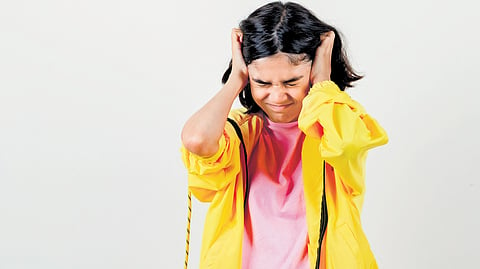Getting an earful during Diwali
Diwali is not just a festival of lights. It is also the festival of sound. This is when crackers assault the eardrums the most. Noise, in excess, unless you are raging to electro or techno spun by a DJ high on Ecstacy is a bummer; it is the distracting agent of interruption, messes with your sleep, and puts you in a bad mood.
Up go stress levels. Noise cancelling earphones would be a good solution, but what if the noise is coming from somewhere inside your ears? It is tinnitus—the sensation of a constant ringing sound in the ear without an external source. Every year after Diwali, there is an alarming rise in the number of tinnitus cases.
Tinnitus noise can vary in loudness. It can be roaring, hissing, swishing, rustling or clicking. It often gets worse when the background noise is low; which makes your chances of falling asleep in a quiet room is low. Tinnitus mostly affects one ear, but don't bet your earplugs on it; it can ring in both ears.
Research suggests the prevalence of this noisy phenom is at about 6.7 per cent among the Indian adult population. Dr Anand Kumar Gupta, HOD & Senior Consultant-ENT, Head & Neck Surgery, Marengo Asia Hospitals, Faridabad says, “Tinnitus is a symptom and not a disease. We should primarily try finding out the root cause of the symptom.
Only then we can treat the patient. Approximately 20-30 patients visit me every month complaining of tinnitus. Some of the patients also suffer from partial hearing loss. The symptoms for tinnitus might go unnoticed for a very long time.” Doctors advice: don't turn a deaf ear to it.
What causes Tinnitus?
Prolonged exposure to loud sounds is the most common cause of tinnitus. Up to 90 per cent of people with tinnitus have some level of noise-induced hearing loss. A variety of conditions and illnesses can lead to tinnitus, including:
● Blockages of the ear due to a buildup of wax, an ear infection, or rarely, a benign tumor of the nerve
● Certain drugs -- most notably aspirin, several types of antibiotics, anti-inflammatories, and antidepressants
● The natural aging process, which can cause deterioration of some parts of the ear
● Meniere's Disease, which affects the inner part of the ear
● Otosclerosis, a disease that results in stiffening of the small bones in the middle ear
● Other medical conditions such as high blood pressure, cardiovascular disease, diabetes
● Neck or jaw problems
● Injuries to the head and neck
Diagnosis
An ENT (ear, nose and throat) specialist will check for earwax or fluid from an ear infection that could be blocking your ear canal. Here are a few questions your doctor might ask to diagnose you for Tinnitus.
● Do you notice ringing in your ears?
● Do you take any medication?
● Are you around loud sounds?
● Do you have a cold or ear infection?
● Do you get migraines?
● Have you ever had a serious head or neck injury?
● Do you have jaw problems?
You might also be referred to an audiologist, who can measure your hearing and evaluate your tinnitus. The ENT may order imaging tests such as magnetic resonance imaging (MRI), computed tomography (CT), or ultrasound.
Prevention
● Use hearing protection. Over time, exposure to loud sounds can damage the nerves in the ears, causing hearing loss and tinnitus. Try to limit your exposure to loud sounds. And if you cannot avoid loud sounds, use ear protection to help protect your hearing.
● Take care of your cardiovascular health. Regular exercise, eating right and taking other steps to keep your blood vessels healthy can help prevent tinnitus linked to obesity and blood vessel disorders.
● Limit alcohol, caffeine and nicotine. These substances, especially when used in excess, can affect blood flow and contribute to tinnitus.
Treatment
The treatment for Tinnitus primarily depends on the cause. Here are a few methods to treat this condition.
Sound therapies
This method is based partly on the view that tinnitus stems from changes in neural circuits in the brain brought on by hearing loss. Some evidence suggests that exposure to sound can reverse some of these neural changes and help silence tinnitus. Sound therapy may also work by masking the tinnitus sounds, helping you grow accustomed to them, or distracting you.
Several types of devices are used in sound therapy. They include the following:
● Tabletop or smartphone sound generators are typically used as an aid for relaxation or sleep. Placed near your bed, you can program a generator or set a smartphone app to play pleasant sounds to help you fall asleep.
● Hearing aids are one of the main treatment options for people with tinnitus who have hearing loss. They help amplifying external noises.
● Wearable sound generators are small electronic devices that fit in the ear much like hearing aids and emit soft, pleasant sounds..
● Combination devices, which fit into the ear like hearing aids, provide sound amplification and sound generation in one device. These devices are another option for treating tinnitus in people with hearing loss.
Behavioural therapy
● Counselling can improve your well-being by helping you reduce the impact of tinnitus on your life.
● Cognitive behavioural therapy teaches you how to identify negative thoughts that cause you distress.
● Tinnitus retraining therapy uses counseling and sound therapy to “retrain” the brain, both emotionally and physiologically, so that you no longer notice your tinnitus.
Medications
● There are no medications specifically for treating tinnitus, but your doctor may prescribe antidepressants or anti-anxiety medications to improve your mood or help you sleep.

